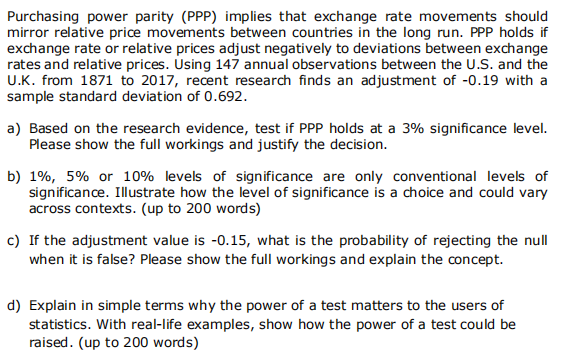Home /
Expert Answers /
Statistics and Probability /
purchasing-power-parity-ppp-implies-that-exchange-rate-movements-should-mir-pa833
(Solved): Purchasing power parity (PPP) implies that exchange rate movements should mir ...

Purchasing power parity (PPP) implies that exchange rate movements should mirror relative price movements between countries in the Iong run. PPP holds if exchange rate or relative prices adjust negatively to deviations between exchange rates and relative prices. Using 147 annual observations between the U.S. and the U.K. from 1871 to 2017 , recent research finds an adjustment of with a sample standard deviation of . a) Based on the research evidence, test if PPP holds at a significance level. Please show the full workings and justify the decision. b) or levels of significance are only conventional levels of significance. Illustrate how the level of significance is a choice and could vary across contexts. (up to 200 words) c) If the adjustment value is , what is the probability of rejecting the null when it is false? Please show the full workings and explain the concept. d) Explain in simple terms why the power of a test matters to the users of statistics. With real-life examples, show how the power of a test could be raised. (up to 200 words)
Expert Answer
ANSWERa) To test if PPP holds at a 3% significance level, we need to perform a hypothesis test. The null hypothesis is that PPP does not hold, and the